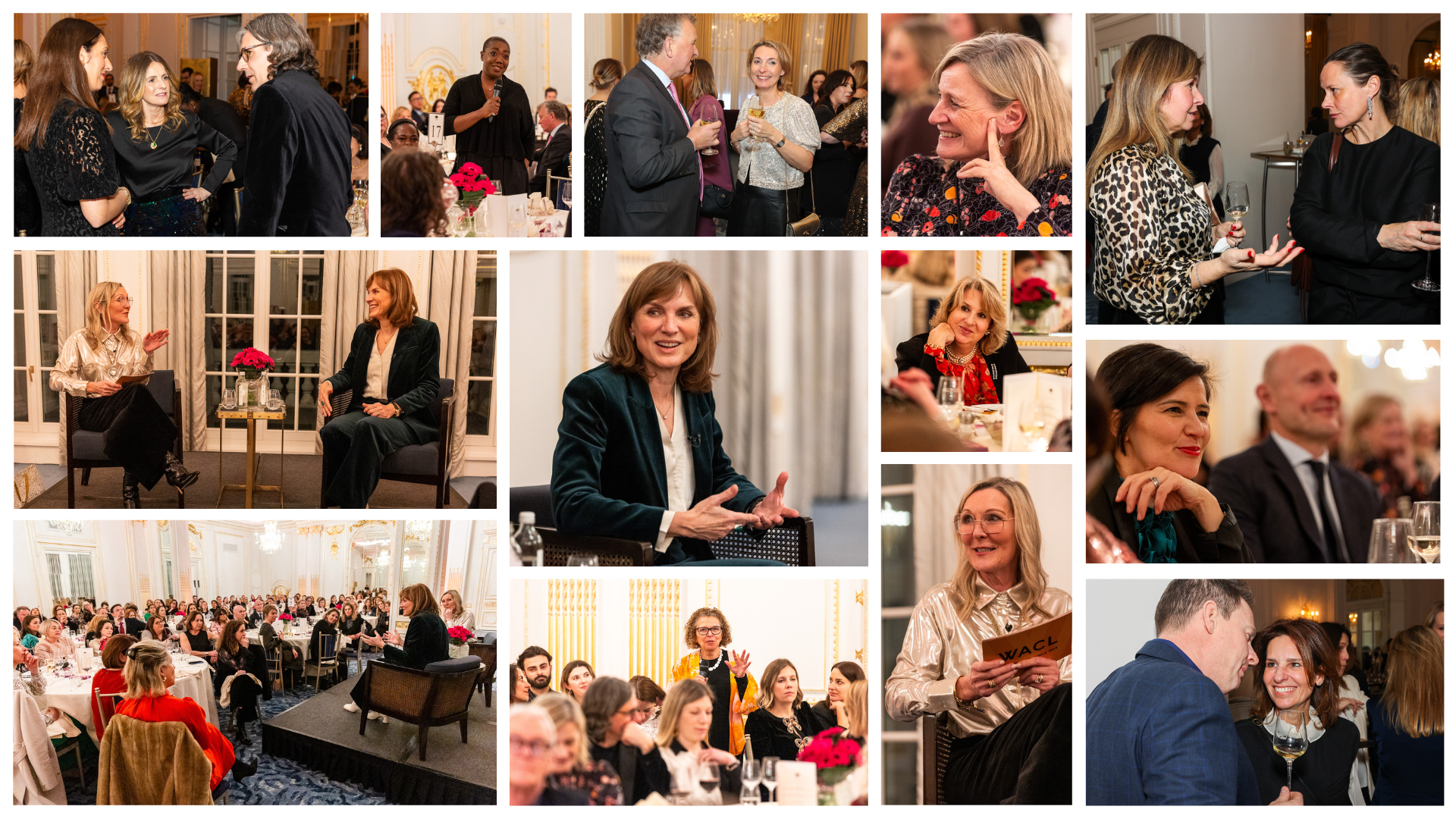
Fiona Bruce Speaker dinner
“Fiona Bruce – the epitome of “firsts” in public service broadcasting
We gathered with our guests in the Ballroom at the Mandarin Oriental last Tuesday for the first speaker dinner of 2025, hosted by our President, Karen Stacey. Karen’s speaker was the British journalist, newsreader, and television presenter, Fiona Bruce.
And what a stupendous evening it was. Expertly interviewed by Karen, Fiona was, by turn, candid, thoughtful, funny, modest, informal, charismatic, and enduringly impressive. A refreshing and powerful presence, Fiona is a rare example of a journalist who can report with great skill, credibility, and gravitas on the most serious matters of daily national importance and yet also handle more frivolous, entertaining presenting with warmth and approachability.
She has achieved ground-breaking ‘firsts’ as a woman in the world of TV broadcasting. Fiona was the first woman to take the chair on BBC News at Ten, the first woman to feature on a BBC general election results programme, and is the first female presenter of Question Time. She has presented many of the BBC’s best-loved, flagship programmes, including Crimewatch, Antiques Roadshow, and Fake or Fortune, alongside her first news anchor position on BBC News at Six.
Whilst working as an account manager at Boase Massimi Pollitt, Fiona met her husband, Nigel Sharrocks (a senior media executive known to many in the room). Advertising didn’t hold Fiona for long. She was increasingly drawn to what was happening in UK politics and attracted to the role of investigative journalism, wanting to do something that would ‘make a difference’ beyond the commercial world.
Fiona’s focus and resilience was evident in the way she pursued her ambition to secure a role at the BBC, starting with a hard-earned role as a researcher on Panorama. Fiona went on to work at BBC2 on Public Eye, a weekly social affairs series, before becoming a reporter on Newsnight and Panorama. In 1999, Fiona got the call to take on the BBC Six O’Clock News. The BBC Head of News informed her that the role was hers but she needed to make an immediate decision on whether or not she wanted the gig. There was no time to think about it. Fiona went for it and so ensued nine years of 13-hour shifts in the BBC Newsroom, working every other weekend, whilst her children were still very young.
She showed us that, whilst being prepared to just ‘go for it’ despite what she knew would be the significant demands of a new role, it is possible to bring balance and boundaries to your working life as a high-profile woman. Fiona praised the critically important combination of a supportive husband and having the same Nanny for 20 years in making her tough schedule feasible. She has always insisted that, even if she’s not home for bath-time, she never misses those important moments like Sports Day or Graduation Day, but was honest in her admission that – like all of us – she “just muddles through it”.
It was inspiring to hear how proud Fiona is of the teams she works with and the work they do together. One in every three cases presented on Crimewatch results in there being a successful arrest. And, after 25 years in the BBC Newsroom, Fiona regards the responsibility of managing the constant shifting of news priorities, which stories will be covered, in what order of priority, and how the stories will be told, as a great privilege.
Striving to be impartial is at the heart of everything she believes in and what the BBC represents. Being robust, and “trying to have a voice of calm and authority and balance to the best of one’s ability” has never felt more important to her than it does now. On the occasions when she is dealing with breaking news on air, Fiona is clear that her job is not to assume or join the dots before the information is available to do so, but to explain, with clarity, what is happening, never emoting no matter how heartbreaking the story might be.
Fiona also demonstrated that, as a high-profile woman in a high-profile job, it’s not enough just to be resilient. You need courage and self-belief in spades too.
When David Dimbleby announced his retirement as the Question Time host in 2019, Fiona was encouraged to apply for the job by one of female colleagues in the BBC Newsroom. The audition process was nerve-wracking: delivering a full programme with all the panellists in front of a live audience, in competition with five other candidates. She got the job. During the first week of hosting the show, Fiona was intensely nervous but got the best reviews of her life. The following week, it all went horribly wrong. Fiona was front page news in the press for 30 days in a row, “and not in a good way!”. 30,000 people signed a petition on social media to get Fiona fired from Question Time.
She weathered it all, and five years on Fiona continues to moderate the passion, posturing – and occasional shouting – by the weekly panellists, commenting that her ‘Bullshit-o-Meter’ is the strongest weapon in her armoury in holding panellists to account!
It was all over far too soon. Thanks to our magnificent President, Karen, our Hon Dinner Secretary, Rachel Bristow, and the brilliant Fiona, a fantastic night was had by all.
Written by Kerry Glazer.
